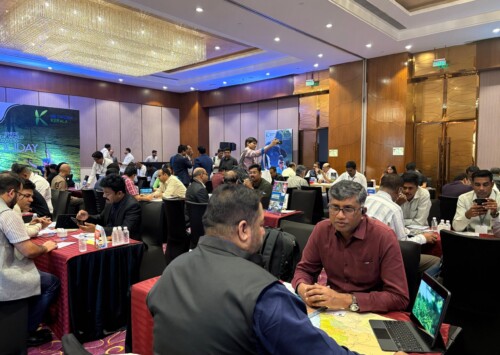EU must immediately terminate Pakistan’s GSP trade privilege
Demolish decades of deception, defiance and denial

Multi-party delegations following Operation Sindoor visited the Belgian capital Brussels on June 4-5 (Photo: Embassy of India, Brussels)
Pakistan has long been a beneficiary of a privilege accorded by the European Union which has allowed it to earn hundreds of millions of euros in export earnings thanks to near-zero import tariffs under the GSP plus scheme of the EU. But decades of deception, defiance and denial by Pakistan using terrorism as an instrument of its state policy must now end, and the European Union has an obligation to act decisively and convey to the country that enough is enough and Pakistan playing a victim card won’t work anymore.

Multi-party delegations following Operation Sindoor visited the Belgian capital Brussels on June 4-5 (Photo: Embassy of India, Brussels)
The massacre of 26 unarmed civilians on April 22 at Pahalgam in Jammu and Kashmir and the subsequent conflict between India and Pakistan has once again put the spotlight on Pakistan’s continued involvement in cross boarder terrorism. And in this context, EU’s reluctance to terminate its GSP plus trade privilege to Pakistan has become a test of EU’s credibility.
For many decades Pakistan has misused and indeed abused this privilege as the country has earned hundreds of millions of euros in preferential exports that EU’s GSP plus scheme facilitates. Yet the country’s government and its supranational force, the Pakistan Army and the Inter-Services Intelligence (ISI), have used the export earnings for exporting Pakistan’s favourite commodity – terrorism – and towards its favourite destination, India.
Fomenting, facilitating and indulging in cross-border terrorism is a clear violation of the basic norms and principles of the EU and Pakistan has a long history of non-compliance with International Conventions. This also calls for urgent action by EU specifically when there are worries that the GSP plus benefits are diverted to support state-sponsored terrorism.
The multi-party delegations following Operation Sindoor which recently visited Europe including the Belgian capital Brussels on June 4-5 and 32 other countries conveyed India’s position on the outrage felt over the terror attack.
The delegation exposed Pakistan’s direct link with the terror attack and at the same time highlighted India’s zero tolerance against terrorism, and the restrained and precise nature of Indian strikes on Pakistan’s terrorist infrastructure, and the “new normal” that India has adopted for terrorist strikes.
Operation Sindoor carried a clear message to Pakistan that India won’t be blackmailed by Pakistan’s “nuclear bluff” and it will not come in the way of anti-terror action by India in future. In a candid admission of Pakistan’s direct involvement in the Pahalgam terrorist attack, country’s Defence Minister Khawaja Muhammad Asif in an interview with Sky News admitted that Pakistan has been doing this dirty job, of fomenting terrorism, for the West and for America for last 30 years.
In discussion of the Indian delegation with European Union Officials, law makers and think tanks in Brussels, the issue of EU’s continued GSP plus status to Pakistan also came into focus, and it was stressed that the trade privilege was the lifeline of Pakistan’s economy, and by withdrawing it, EU will send a loud and clear message to Pakistan that it must face the consequences.
Days after the visit of the delegation, External Affairs Minister of India S Jaishankar also visited Brussels on June 11-13 to participate in the first EU-India Strategic Dialogue. Jaishankar gave a blunt warning to Pakistan that India will not hesitate to hit deep inside the country’s terrorist infra, and that India does not need advice or consent of Europe to protect its security.
Operation Sindoor has changed India and Indian politics for ever. The twin objectives with which Pahalgam attack took place, damage India’s economy and create social mayhem in the country have failed, and Pakistan stands exposed. If Operation Sindoor demonstrated India’s ability to apply military power with restraint and precision, the durability of that approach will depend on how future crises are managed by New Delhi. India has also exposed the hypocrisy and double standard of the West and Operation Sindoor adds a new approach to India’s strategic toolbox and doctrine — if America can travel 17,000 km to attack terrorists in Pakistan, why can’t India target terrorists only 500 km inside Pakistan?
Nations make progress when their institutions get stronger and become independent. In the case of Pakistan, other than military no other institution has been allowed to become independent. This is a monumental tragedy for any country. More than seven decades of hostility by Pakistan, along with declared and undeclared wars — with Pakistan losing all the wars – have only exposed Pakistan’s decades-long promotion of terrorism. Sadly, even after seven decades, Pakistan has not been able to liberate its own population from the establishment and the country’s population is being held ‘hostage’ by the Army, ISI & Military Intelligence.
Every State has an Army, but in Pakistan, the Army has a State and ever since independence, the Army has exercised dominant influence on domestic politics of the country. The country has suffered several coups in 77 years since its independence and the current conditions do not look promising at all. The State is on the brink of failing as the political leadership remains clueless about how to reconcile the conflicting interests of multiple power centres and stakeholders and how to maintain the sanctity of institutions.
Pakistani state is indulging in systematic genocide against Christians, Sikhs and Hindus. The minority have experienced historical and religious persecution and systematic violence. These have been occurring in the form of forced conversions, demolition and desecrations of churches and temples.
The EU must also wake up to the fact that for long Pakistan has had a dubious distinction of having become synonymous with the phrase “epicentre of terrorism” and being host to the largest number of terrorists proscribed by the United Nations. It must make EU see if its specialised and preferential trade treatment has not been a policy failure and to what role did this preferential treatment play in bringing Pakistan to the precipice where it finds itself today.
Pakistan spends billions of dollars on its terrorist infrastructure. In 2008, Pakistan-trained and sponsored groups attacked multiple sites around Mumbai, gunning down civilians, including Europeans and Americans. To this day, Islamabad protects the masterminds of that attack. Nor have Pakistani authorities ever explained how the al Qaeda founder Osama bin Laden came to be in Abbottabad and living a lavish life.
EU’s strategic challenge
For EU to continue extending the special trade privilege to Pakistan, a terror-sponsoring regime with the blood of Indians, Europeans and Americans, and many others on its hands, is perverse and worrisome. The geo-political uncertainty, geo-economic challenges and amid profound changes in the global order, including war in Ukraine, it is time for EU to come out of the past and become self-reliant to face the challenges of change. Europe today needs friends, and it can count on India, but Europe must also address India’s concern. If Europe thinks that terrorism is a bilateral problem between India and Pakistan, it is living in fool’s paradise as terrorism will one day knock at its door too.
It appears that EU-India free trade agreement negotiation is progressing satisfactorily and both parties are moving towards concluding the negotiations before the EU-India Leaders’ Summit which New Delhi will host in December this year. It is an opportunity for India to press EU to come clean on its GSP policy on Pakistan. The tragedy for Pakistan is that it cannot disassociate itself from terrorism and the challenge for EU is that it does not know how to and when to stop experimenting its GSP plus policies on a failed state.
It is unlikely that EU will withdraw GSP plus to Pakistan at this stage, but India should seek a commitment from EU that when the GSP status expires in two years, in 2027, it shall not be renewed. The ball is in the EU Court, and it must decide how deeper strategic relations it wants with India. India is making the EU’s GSP a serious issue of bilateral relations and there should be a realisation in the EU that it cannot afford to ignore India’s sensibility and security concern, and it must address the GSP issue with a sense of urgency.
Terrorism as Pakistan’s state policy
Pakistan provides safe haven, transit, and moral, political, financial and diplomatic support to several groups engaged in terrorism including Lashkar-e-Taiba (LeT) and Harakat ul-Mujahidin (HUM). Terrorists under these groups manipulate fear through the use of violence and terror to achieve their objectives. Pakistan’s strategic obsession with violence and terrorism has large scale security for international community and for EU at large.
In a rare acknowledgement on Pahalgam attack, the global terror watchdog Financial Action Task Force (FATF) on June 16 said that the attack could not have occurred without the availability of finances and the means to move those funds between terror supporters. India has maintained that Pakistan has given safe haven to terrorists, which became evident when Islamabad’s military officials were present at the funeral of terrorists killed in Operation Sindoor strikes on terror bases.
In this context, it is important for the European Commission to make the GSP plus monitoring and review process more transparent so that it can be understood how a nation like Pakistan with its gross human rights violations could even qualify for the GSP plus status in the first place.
Disrespect to international obligations
Trade policy being one of the key mandates of the European Commission, a country which is engaged in perpetual violence against religious minorities and the persecution of Christians and other religious minorities, has no right to receive any special trade privilege from the EU. This also goes against the very ethos of European values, life and respect for minorities. The GSP was an instrument afforded to Pakistan with the hope, and promises made by the country, that it shall improve its human rights record, but sadly it has failed on all counts. Since January 2014, Pakistan has been a beneficiary of the EU’s GSP plus status and yet Pakistan has never taken its commitment to the UN Conventions seriously and has remained in violation of them throughout.
Also, the international Monetary Fund and the World Bank can do so much more to fence off and curtail terror financing persistently carried out by Pakistan, notably by ending the loans and numerous privileges accorded to the country which helps it generate resources for continuing its nefarious activities.
Under the EU’s Generalised Scheme of Preferences Plus (GSP+), the country has obligations to respect 27 international core conventions. Pakistan’s failure to respect obligations under GSP, is not new yet Pakistan has continued to enjoy the comfort of EU’s GSP trade privilege which enables it to conveniently access European markets via lower tariffs. Allowing Pakistan to reap the benefits of GSP plus without adequate progress in compliance is sending a wrong message not just to Pakistan but also to other nations that currently benefit from this arrangement.
Pakistan considers EU’s GSP trade privilege as its “right”, treats this as a “favour” to EU and uses this as a “political tool” to keep EU engaged with the country. Despite the critical lifeline extended by the EU at a time when Pakistan had few options, Pakistan has not lived up to EU’s expectations and the commitments that were part of the GSP plus deal. It has consistently failed to deliver on good governance as well as sustainable development. Pakistan’s poor track record in fulfilling other conditions offers no hope. Though Pakistan was removed from the Grey Zone of the Financial Action Task Force in 2022, it is back doing business as before, and it is time that the country is again placed under FATF.
Over the decades, especially since 9/11, Pakistan has mastered the art of playing victim at international platforms. In fact, arms, trade, and terror was never off the list of Pakistani government long term strategy. It is time NATO Member States in the EU countries reassess if Islamabad deserves to be a major non-NATO ally.
New way forward
In the light of the above, only a strong and firm action by the EU will force Pakistan rethink on its terror sponsorship policies. Despite significant leverage to enact positive change in Pakistani society and use the asymmetry in trade relations to its advantage, the EU has failed to use GSP trade privilege to leverage its strategic interest and promote EU’s policies. Also, the EU has failed to take the strategic advantage with the result that Pakistan has become a failed state or even narrative of a rogue state.
Pakistan’s human rights record doesn’t merit it preferential trade benefits by any country. The EU’s GSP plus for Pakistan is in fact a disrespect to humanity. It is important for the decision-makers in the EU to demonstrate a strong political will and determination by withdrawing GSP to the country and show to other countries that withdrawal of the benefits in case of noncompliance with the prerequisites remains an option that the EU would not pull back from exercising, should the countries repeatedly fail to deliver on their promises. Let EU make an honest evaluation.
(Sunil Prasad is the Secretary General of Brussels based Europe India Chamber of Commerce. The views expressed here do not necessarily reflect those of Media India Group.)









